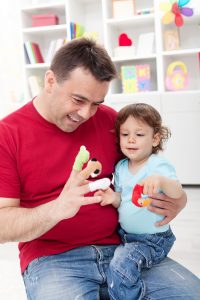 Put simply, narrative skills are storytelling skills. You may not think of storytelling as an important life skill, but it goes far beyond entertaining friends at a dinner party. In fact, narrative skills are a complex and important part of communication, and we use them several times a day to:
Put simply, narrative skills are storytelling skills. You may not think of storytelling as an important life skill, but it goes far beyond entertaining friends at a dinner party. In fact, narrative skills are a complex and important part of communication, and we use them several times a day to:
- Comprehend what we read
- Entertain
- Re-tell events
- Tell others about ourselves
- Give instructions
- Report
- Persuade
- Describe
Highlights:
|
Narrative skills help us do all of these things in an organized, efficient, and engaging way. Individuals with poor narrative skills may jump all over the place, skip important details, go off on tangents, or go on and on about something. This can have negative consequences. “We need narrative skills to succeed at school or work or in relationships,” says Melissa Marinelli Izquierdo, pediatric speech-language pathologist. “When you get stuck trying to communicate, it feels frustrating for both you and the listener.”
The good news is that you can give your child a strong narrative foundation, starting in babyhood.
How Narrative Skills Develop in Childhood
Narrative skills take center stage in school when children need them for things reading comprehension, creating reports, and building friendships. To be successful at these tasks, they need a narrative foundation, which they get from:
Routines: As babies develop receptive language, they learn narrative skills like sequencing and predicting from daily routines. They learn the “story” of bedtime, for instance: Bath, massage, lullaby, crib. To reinforce this learning (and many other language skills), parents and caregivers can talk about these routines as they’re happening.
Play: Babies and toddlers learn narrative skills during playtime, especially when an adult describes their play before they can speak. As a child develops speech, he and a parent or caregiver can “co-create” a story during play. In our BabySparks program you can find an activity called “Creating a Story,” which is a great way to do this.
Reminiscing: Talking with your toddler about things that have happened is a key way to build narrative skills. Our “Recalling Adventures” is a fun way to do it.
Answering follow-up questions: A parent or caregiver can do this anytime a child talks about something: Toddler says “Cup boom!” and adult says “What happened to your cup?” Toddler says “Kitty go” and adult says “Where did kitty go?”
Reading: Reading is one of the easiest and best ways to build narrative skills. If you browse our reading activities, you will find ways to read with your baby that help him learn how to identify main characters and setting, determine how characters are feeling, and describe, sequence and predict events.
To read more about the rich ways your little one’s language develops during his first two years, start here.








